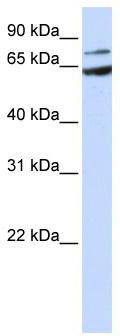Frizzled 8 (FZD8) Rabbit Polyclonal Antibody
Frequently bought together (1)
Other products for "FZD8"
Specifications
| Product Data | |
| Applications | WB |
| Recommended Dilution | WB |
| Reactivities | Human |
| Host | Rabbit |
| Isotype | IgG |
| Clonality | Polyclonal |
| Immunogen | The immunogen for anti-FZD8 antibody: synthetic peptide directed towards the N terminal of human FZD8. Synthetic peptide located within the following region: PDTLCMDYNRTDLTTAAPSPPRRLPPPPPGEQPPSGSGHGRPPGARPPHR |
| Formulation | Liquid. Purified antibody supplied in 1x PBS buffer with 0.09% (w/v) sodium azide and 2% sucrose. Note that this product is shipped as lyophilized powder to China customers. |
| Purification | Affinity Purified |
| Conjugation | Unconjugated |
| Storage | Store at -20°C as received. |
| Stability | Stable for 12 months from date of receipt. |
| Predicted Protein Size | 73 kDa |
| Gene Name | frizzled class receptor 8 |
| Database Link | |
| Background | FZD8 is a member of the frizzled family. Members of this family are seven-transmembrane domain proteins that are receptors for the Wingless type MMTV integration site family of signaling proteins. Most frizzled receptors are coupled to the beta-catenin canonical signaling pathway. This protein is highly expressed in two human cancer cell lines, indicating that it may play a role in several types of cancer. The crystal structure of the extracellular cysteine-rich domain of a similar mouse protein has been determined.This intronless gene is a member of the frizzled gene family. Members of this family encode seven-transmembrane domain proteins that are receptors for the Wingless type MMTV integration site family of signaling proteins. Most frizzled receptors are coupled to the beta-catenin canonical signaling pathway. This gene is highly expressed in two human cancer cell lines, indicating that it may play a role in several types of cancer. The crystal structure of the extracellular cysteine-rich domain of a similar mouse protein has been determined. |
| Synonyms | FZ-8; hFZ8 |
| Note | Immunogen Sequence Homology: Dog: 100%; Human: 100%; Mouse: 93%; Rat: 92% |
| Reference Data | |
| Protein Families | Druggable Genome, Transmembrane |
| Protein Pathways | Basal cell carcinoma, Colorectal cancer, Melanogenesis, Pathways in cancer, Wnt signaling pathway |
Documents
| Product Manuals |
| FAQs |
| SDS |
{0} Product Review(s)
0 Product Review(s)
Submit review
Be the first one to submit a review
Product Citations
*Delivery time may vary from web posted schedule. Occasional delays may occur due to unforeseen
complexities in the preparation of your product. International customers may expect an additional 1-2 weeks
in shipping.






























































































































































































































































 Germany
Germany
 Japan
Japan
 United Kingdom
United Kingdom
 China
China



